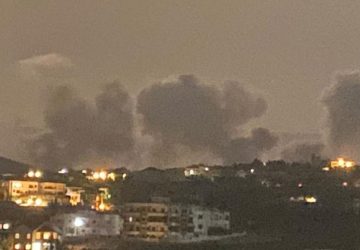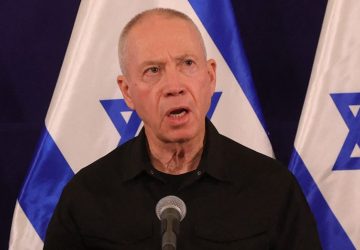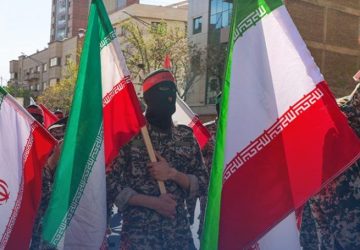Hezbollah leader Hassan Nasrallah has vowed retaliation against Israeli attacks involving booby-trapped communication devices, which he described as a “declaration of war.” Nevertheless, his primary focus remains securing a ceasefire in Gaza.
With a somber demeanor, an occasionally muffled voice and a delivery punctuated by sighs, Hezbollah leader Hassan Nasrallah vowed on Thursday to respond forcefully to the recent Israeli double attack involving booby-trapped devices targeting his fighters on Tuesday and Wednesday.
Although he challenged Tel Aviv to follow through on its plan to return displaced residents from northern Israel and establish a security belt along the southern border, Nasrallah reaffirmed that his primary objective remains the same: securing a ceasefire in Gaza.
In his highly anticipated speech following the Israeli double attack that severely impacted his forces (resulting in 37 deaths and 3,021 injuries, according to the latest official figures), Nasrallah adhered to his usual rhetoric, both in style and substance. However, he intensified his threats against Israel and, possibly for the first time, clarified why the south remains engulfed in conflict: “The support front with Hamas remains our strongest bargaining chip for Gaza,” he stated.
The Hezbollah leader quickly addressed the dual attack involving booby-trapped pagers and walkie-talkies, acknowledging it as a “severe blow” to his party. He accused Israel of having “overstepped all boundaries and red lines and broken every rule of engagement,” emphasizing that the explosions occurred in hospitals and various public spaces “where numerous civilians, including women and children, were present.”
A declaration of war
According to him, what transpired is “a declaration of war that has not shaken, and will not shake Hezbollah,” and a “premeditated attempt at murder.” He condemned Israel for “attempting to kill 5,000 people in just two minutes” with the explosions of pagers and walkie-talkies, criticizing Tel Aviv for “using civilian devices to carry out its attack.” He further declared, “this atrocious assault is a massacre that should be added to the list of massacres perpetrated by the Israeli enemy,” while also condemning it as a “blatant aggression against Lebanon and its sovereignty.”
Nasrallah acknowledged the high number of eye injuries among the wounded. He suggested that the casualty count could have been even higher if many of the pagers had not been turned off and if all devices had been distributed.
He announced that his party has established an investigation committee to trace the pagers from their production, asserting that “it has already yielded preliminary findings and is expected to uncover the truth behind this unprecedented attack soon.”
“We will not yield. We will grow stronger and remain prepared to face the worst,” added the Hezbollah leader, with much of his speech seemingly directed at reassuring his audience, who was shaken by the heavy blow dealt by Israel.
Acknowledging the disparity in resources between the two forces, Nasrallah emphasized “the determination and resilience of (his) party, which enables it to achieve successive victories.”
As the Israeli air force carried out a series of mock air raids over Beirut, dropping thermal balloons and breaking the sound barrier, Nasrallah highlighted “the significant pressure exerted by Hezbollah on the southern front, preventing Israel from fulfilling its war objectives.”
Regardless of the destruction in this part of Lebanon and the toll on its population, Nasrallah acknowledged his willingness to continue making sacrifices solely to enhance the negotiation conditions for Palestinians aligned with Iran. “The support front is currently the most significant bargaining chip the Palestinians possess to halt the aggression against Gaza,” he stated, reaffirming that a return to calm on the southern front is impossible as long as the war in Gaza persists. “And this is true, regardless of the sacrifices, consequences and impact on the region,” he declared, emphasizing his belief that “the balance of terror imposed on the southern front will prevent Israel from launching a large-scale war against Lebanon.” This also suggests that he is prepared for actions that could trigger a broader conflict, which the international community is striving to avoid.
‘A hell for Israeli soldiers’
Concerning the “changes in war objectives” announced by Israel on Tuesday morning to facilitate the return of displaced populations from the northern regions, Nasrallah pledged not to allow Tel Aviv to achieve its goals. “You will not succeed,” he declared, reiterating that “only a ceasefire in Gaza will enable displaced Israelis to return home.”
He warned Tel Aviv against launching a military operation for this purpose, cautioning that it would “only result in the further displacement of Israelis.”
At the same time, the Hezbollah leader “challenged Israel to invade Lebanon to forcibly establish a security belt along the border,” asserting that such an operation would provide Hezbollah with “a historic opportunity to target Israeli soldiers” and vowing to “transform it into a hell for the Israeli army.”
He concluded by pledging to retaliate against the double attack that occurred on Tuesday and Wednesday, reiterating, as he often does, that his party “reserves the right to set the date, location and nature of the response.” Nasrallah stressed that “the details of the retaliation will be restricted to a small circle of Hezbollah officials,” hinting at a consolidation of control within his party.





